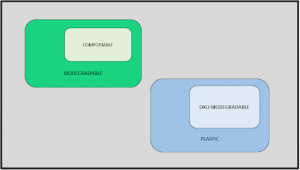Oxo-biodegradable – the great villain ” for our environment.

The rise of Oxo-Biodegradable Plastics and Green Washing
“Green washing, whereby businesses and corporations use terms like sustainable and biodegradable to mislead customers into believing that their products are harmless for the environment.”
As we are growing attuned to the needs to implementing sustainability in our daily lives, the green movement is gaining momentum everyday and just like any other movement or cause, sustainability is becoming susceptible to practices like green washing, whereby business and corporations use the term to mislead customers into believing that their products are harmless for the environment.
Oxo Biodegradable Plastic is one such questionable byproduct of this movement and there are several schools of thought debating the positive and negative impacts it has on the environment.
Defining Oxo-Biodegradability
To understand oxo biodegradability, it is essential to examine the meaning of biodegradability. Biodegradable materials are those that can fully break down and decompose in the presence of bacterial organisms present in the environment, within a short span of time. Oxo Biodegradable materials are those that do not decompose within a small time frame unless other materials are added to the mix in order to aid faster decomposition.
In the case of Oxo Biodegradable Plastics, metal salts like Cobalt and Manganese are added to the mix to help speed up the process of degradation which leads to the plastic breaking down into small particles, invisible to the eye.
Don’t be fooled by that ‘Biodegradable’ tag!
Oxo Biodegradable Plastics are far from being biodegradable. The process of degradation leaves the plastic in small, micro sized particles that later come to be known as micro plastics. Micro plastics are one of the top contributing elements in environmental pollution today and some have deemed oxo biodegradable microplastics to be more harmful than regular plastics, due to their reactivity to light and radiation.
The Ugly Side of Oxo Biodegradable Plastic
In addition to having all the same negative effects as regular plastic, oxo biodegradable plastic causes even more harm because of a variety of reasons. Firstly, the ‘Biodegradable’ tag leads corporates to neglect proper disposal of the plastic waste, because of the assumption that oxo biodegradable materials can fully decompose in most compostable environments. In reality, lack of oxygen can stunt the decomposition process, taking oxo biodegradable plastics years to fully break down into carbon dioxide, water and biomass. Secondly, the presence of metal salts and chemical additives can cause serious reactions when exposed to heat or UV radiations, the ill effects of which are still not completely known. Maybe that’s why most governments like United Kingdom and European Union along with organisations such as PepsiCo, Nestle and Uniliver are exploring a ban on usage of oxo biodegradable plastics altogether.

Properties to watch out for in Oxo Biodegradable Plastic
For the most part, Oxo Biodegradable plastics have a long shelf life and have a similar hand feel to regular plastic. However, the main distinction between bio plastics, regular plastic and oxo biodegradable plastics is that the latter are hardly certified by trusted or certification bodies. Most experts on sustainability have detached themselves from the conversation about positive impacts of Oxo Biodegradability.
An Oxo Biodegradable Plastic Free Future?
The rising concerns about plastic pollution have made its way to Australia and the local government is all set to ban plastic in its various forms, especially plastics labelled as biodegradable due to lack in regulation of their production. The National Plastics Plan will soon come into action this year and will focus on minimising the problem of fragmentable plastic in Australia. Similarly non governmental organisations of UK and Sweden have been urging their respective governments to ban oxo biodegradable plastics as a means of eliminating the concerns regarding microplastics. Spain, Italy and France have already exercised a ban on all oxo plastics whereas belgium, bulgaria and Hungary have a strict policy against labelling of oxo plastics as biodegradable plastics.
How Business Could Be Doing Their Bit
Most businesses make the switch to sustainability because they are on the better path to reducing their carbon footprint. And while, the intentions behind such a move may be pure, it is also essential to steer clear of counterproductive practices such as opting for oxo biodegradable plastics. The best alternative for corporations is to watch out for 100% biodegradable and compostable plastics which meet the mark for sustainability norms. It is also important to look out for genuine certification and other indicators of trust and transparency when it comes to the nature of plastic a business is opting for.





Comments are closed.